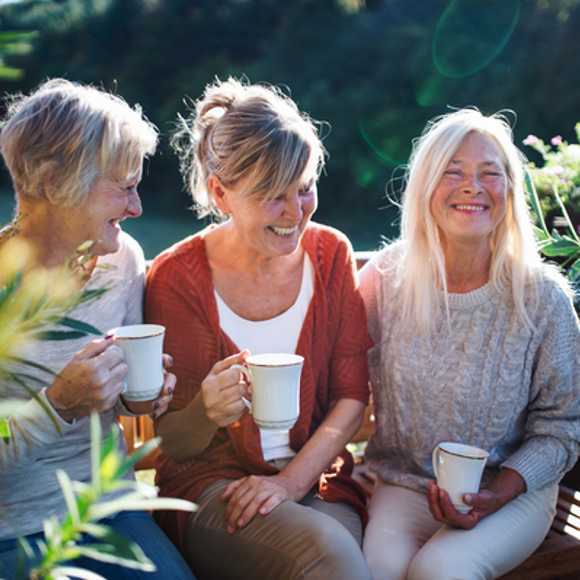
Retirement marks a significant transition in your life, offering the promise of independence, relaxation, and a different pace. However, you may find that the shift from a structured work life to the flexibility of retirement brings unexpected challenges. If you’re feeling depressed or unsure about how to navigate this phase, you're not alone.
Depression in retirement is more common than you might think, especially as you adjust to the change. While retirement brings new possibilities, it’s natural to face emotional challenges along the way. By acknowledging these feelings and exploring ways to manage them, you can embrace this new chapter with confidence and find joy in the journey ahead.
Understanding retirement depression
Depression affects around 22% of men and 28% of women aged 65 and over, so if you’re experiencing symptoms of depression, remember that many others experience these feelings too.
It’s natural to feel unsettled as you adjust to life after retirement, especially when you lose the structure, identity, and social connections that work provides. Retirement depression often stems not from the loss of work itself, but from the loss of what work gave you: routine, purpose, and a sense of accomplishment.
For many, work provided a clear schedule, a way to define who you are, and a reason to engage with others every day. These changes can leave you feeling disconnected from your sense of self. It’s important to recognise this, as understanding the source of your feelings can help you navigate this phase of life with greater awareness and compassion.

The importance of structure and purpose
For many, work provided a clear routine and purpose, a sense of accomplishment, and daily interactions with colleagues. In these ways, work was a means to an end - it helped you cultivate structure, purpose and connection. So it may be that it’s not work you’re missing, but these feelings. That’s why it’s important to address how to develop these feelings in retirement, rather than focusing on work as the thing you’re lacking.
Creating routine is a great way to bring structure into your day, if that’s important to you. Whether that’s through setting personal goals, pursuing hobbies, or staying physically active, focus on establishing a daily rhythm that you find fulfilling.
Find new ways to bring purpose into your life too. That could involve exploring new passions, learning new skills, or volunteering for causes that align with your values. Volunteering offers the chance to build meaningful connections, learn new skills, and give back to the community, bringing a sense of purpose and fulfilment.
We make volunteering opportunities accessible for all of our residents, and they’ve been part of some incredible projects so far, including building a local adventure playground and creating a magical sensory garden.
Social connection is another key aspect of work that many retirees miss. Thankfully, there are plenty of ways to stay connected in retirement. Engaging in community activities, joining clubs, or volunteering can help you build a new social network. These connections provide a sense of belonging and help foster a sense of community, much like the camaraderie you experienced at work.
Retirement communities are an incredible way to help bring more of all of these aspects into your life. They’re designed to help you find and maintain purpose by living in a vibrant community that prioritises wellbeing, independence and social connection.
By recognising what you’re missing from your working life and finding ways to recreate those elements in retirement, you can find new purpose and meaning, allowing this chapter of your life to be as fulfilling as any previous one.
Approaches to managing retirement depression
While it's not about suddenly embracing a perfect new beginning, the goal is to find small ways to create meaning and connection in this new chapter. Whether it's exploring an old hobby, setting a simple goal, or finding community, even the smallest steps can help create a sense of purpose and spark a shift toward something positive.
Find meaning in retirement
Retirement doesn’t have to mark the end of your personal growth, nor does it have to be about making drastic changes or feeling the pressure to ‘start fresh.’
Instead, seek small ways to stay connected to what matters most to you—whether that’s your passions, trying something new or simply enjoying the freedom to explore your local greenspaces. The goal is to take things one step at a time, allowing space for new experiences without expectations.

Set new goals
Having something to focus on, even if it’s as simple as learning a new skill or becoming more active, can provide a sense of purpose and satisfaction. Whether it’s picking up a musical instrument, getting involved in a local community project, or finding ways to stay physically active, goals—big or small—can give you something to look forward to each day.
Here are some ideas:
- Learn a musical instrument
- Start a new fitness routine, like Tai Chi, yoga or swimming
- Join a local book club or start a reading challenge
- Learn a new language or brush up on a language from your past
- Plant and maintain a vegetable or herb garden - our residents love the allotments and gardening groups at our communities
- Take up painting, drawing, or another form of art
- Explore new hobbies like photography, gardening, or knitting
- Take part in community theatre or drama groups
- Start a small DIY or home improvement project
- Take part in local sports or outdoor activities - parkrun is a great initiative across the UK, or games lawns, like the ones in our retirement communities, often host fun events!
And if you want someone to share your goals and passions with, our retirement communities are a wonderful place to start. We’re so proud of our thriving, buzzing communities where likeminded people can come together to enjoy what the love together. Whether the groups and events already exist, or you’d like to be part of setting it up, it’s all possible.
Build and maintain social connections
It’s important to remember that social engagement plays a key role in maintaining good mental health, and while it might feel challenging, there are small steps you can take to reconnect with others.
What are you interested in doing (or starting), and how can you find other people that are interested? For example, if you enjoy hiking, find a local walking group, or if you prefer to read, seek a book club. Looking online or checking community centres for flyers are great ways to find like-minded communities to share what you love with.
We’re proud to provide retirement communities where our residents can meet like-minded people to share in activities, groups and events. From book clubs and gardening groups to exercise classes, these activities help individuals meet new people, form lasting friendships, and find a supportive, welcoming community.

Stay physically and mentally active
Regular physical activity helps release endorphins, the body’s natural mood boosters, which can provide an immediate sense of relief from depressive symptoms. Over time, exercise helps regulate mood by balancing stress hormones, improving sleep, and fostering a sense of achievement and control.
Find ways to exercise that you enjoy, rather than something that feels like a chore. Some ideas could be:
- Signing up to your local gym
- Going to group exercise classes
- Finding a pilates or yoga studio you like
- Booking into a dance class
- Trying your hand at a local tennis court or golf course
Instead of seeking these out across your local area, you could consider relocating to somewhere that has all this and more onsite. Retirement communities offer a host of wellness amenities - at our communities across the UK you can find everything from gyms to fitness classes to dance classes.

Recognising and addressing emotional needs
It’s important to acknowledge that feelings of depression and loneliness may arise during retirement. Recognising these emotions is the first step towards understanding what you might need to feel more supported. It’s important to acknowledge that these feelings are valid and can be an invitation to explore your emotional landscape more deeply. If these feelings persist, seeking support can provide a helpful way to work through them without feeling isolated.
When addressing emotional needs, it can be useful to gently check in with yourself regularly, asking how you’re feeling and what might bring you comfort. Reaching out to a trusted friend or family member can help lighten the load too.
Journaling can offer an opportunity to process thoughts and emotions - you could try free writing, and letting your feelings come out of you onto the page, or to help bring more perspective, write down three things you’re grateful for each day. These don’t have to be big - it can be as simple as “I’m grateful that I spent time outside today” or “I’m grateful that I cooked myself a delicious breakfast”. Gratitude has been shown to help alleviate anxiety and depression and have a meaningful impact on the way we think.
Engaging in creative activities can provide a sense of release and joy too - drawing, painting, listening to music, clay work, gardening are some ways to start.
Recognising that your emotional needs are important and seeking gentle ways to address them can help bring a sense of peace and connection during this transitional time.
The role of professional help
If the symptoms persist or worsen, seek professional help. Therapists, counsellors, and support groups offer valuable resources for managing mental health. You can seek local or online counsellors, or speak to your GP and ask to be referred to the NHS mental health service where you can get talking therapy and CBT. You can also look at the incredible mental health support available through registered UK charity, Mind.
If you want to speak to someone as soon as possible, you can reach out to Samaritans.

Retirement can bring a mix of emotions, including feelings of depression and loss. It also offers the chance for a new and fulfilling phase of life. It’s not about having to ‘start over’ but finding ways to stay physically and mentally active, build social connections, set new goals, and be gentle with yourself through the ups and downs. These small, meaningful steps can make a big difference in managing the challenges of retirement depression.
The benefits of living in a retirement community like ours include providing the support you need, offering a space to find purpose, connecting with others, and continuing to grow. If you're considering retirement living, it could be a positive way to enhance your quality of life and feel part of a community that understands your needs.
Retirement doesn’t have to be defined by depression or isolation. Instead, it can be a time to rediscover what matters to you, engage in new experiences, and embrace a sense of belonging. Take control of your well-being by seeking support, staying active, and surrounding yourself with a community that values and understands your journey.
